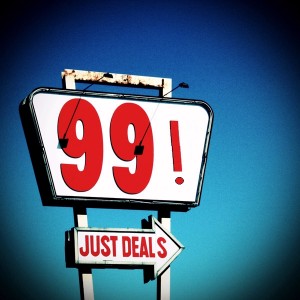
“A Kindle priced below $100 seems almost a sure thing.”
That’s the opinion of Chad Skelton, who’s both an investigative reporter and blogger for the Vancouver Sun. He predicts that Amazon’s going to make big cuts in the cost of a new Kindle — because it will bring them more customers. “Amazon has already shown a willingness to make deep price cuts on the Kindle,” Skelton writes, documenting the drops from its original $399 price to just $139. He does disagree with the prediction that Amazon may give away a free Kindle (and then try to earn back their money on e-book sales). But he notes that “there are likely a bunch of customers who Amazon can bring into the market once they drop the price down to two digits.”
“The only question is when. If I was a betting man, I’d figure Amazon would drop the Kindle’s price to $99 in time for the holiday shopping season.”
He isn’t the first person to predict Amazon will keep lowering the Kindle’s price. Last August, a technology columnist at Slate argued that Amazon would drop the price of a Kindle to $99 before Christmas of 2010! They didn’t — but it’s still a fascinating article, because it broke down the actual cost Amazon paid for the parts of a Kindle. Over a year ago, E-Ink collaborated with a silicon chip manufacturer to create a way to run the Kindle with a much cheaper semiconductor. And in addition, at least one Amazon’s competitor unveiled a $99 digital reader last July.
“All of these trends likely guarantee that Amazon will release a $99 e-reader someday,” Slate‘s columnist concluded. (And he compared Amazon’s pricing to that of an aggressive salesman in a TV ad, joking that Amazon’s CEO was “the Crazy Eddie of the e-book business: Every time a rival gets close to the Kindle’s prices, Bezos goes even lower. He will not be undersold!”) But there’s already been research into how consumers would react to a $99 Kindle, Slate‘s reporter also notes. While less than 20% of the adults in America would consider a reader costing more< than $100, “nearly 65 percent said they would consider one” if the price were below $100, “and almost 40 percent said they’d buy it within six months!”
Imagine what that would mean for Amazon. Suddenly there’d be three times as many people who wanted to buy the newest Kindle. Presumably they’d triple the sales of e-books in Amazon’s Kindle store. This would give Amazon even more leverage with publishers — though I don’t know whether it would ultimately result in lower e-book prices.
It’s hard to predict the future — as Slate’s columnist found out when he started writing that “tech companies usually ramp up production and lower their prices for the holidays.” But maybe he was right about everything except which holiday Amazon. It’s still possible that Amazon will roll out a $99 Kindle for Christmas.
But instead of Christmas of 2010, it could be Christmas of 2011.